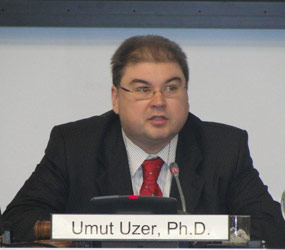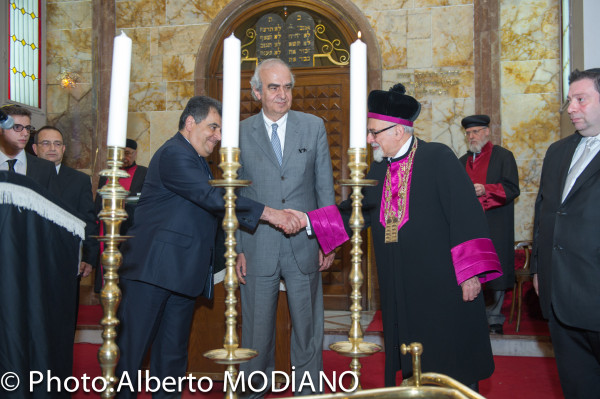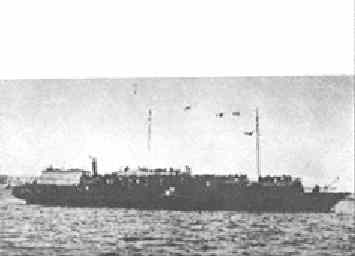When International Holocaust Remembrance Day was marked around the world on January 27, Turkey responded by sending high-ranking government officials to a ceremony in Istanbul and its foreign minister to a commemorative event in the former Auschwitz extermination camp.
Turkey’s formal interest in the Holocaust may have come as a surprise to some, but Turkey has been commemorating International Holocaust Remembrance Day since 2011.
As an observer member of the International Holocaust Remembrance Alliance (IHRA), Turkey is obligated to support Holocaust education, remembrance and research. One of eight observer countries in the 31-nation organization, Turkey joined IHRA in 2008.
Turkey, the only Muslim state in IHRA, commemorates the Holocaust to enhance its national interests, according to Umut Uzer, an associate professor in the department of humanities and social sciences at Istanbul Technical University.

Uzer explained Turkey’s motives in a talk he gave on the subject at the University of Toronto on March 16.
First, Turkey wants to burnish its international image. Turkey’s Islamist government, led by President Recep Tayyip Erdogan, has come under scrutiny for its authoritarian tendencies and its rhetorical attacks on Israel.
Second, Turkey is trying to assure its 20,000 Jewish citizens that they’re first class citizens despite the terrorist bombings of Neve Shalom Synagogue in 1986 and 2003.
Third, Turkey may be seeking full membership in IHRA, which was established in 1998 by Sweden’s former prime minister, Goran Persson.
Fourth, the Turkish government may be attempting to deflect attention away from the mistreatment and murder of Armenians by the Ottoman Empire in 1915. About one million Armenians perished during this period.
Uzer, whose fields of study include Turkish foreign policy and the Arab-Israeli conflict, doubts whether Turkey’s observance of International Holocaust Remembrance Day is connected with its current feud with Israel.
Turkey’s relationship with Israel, once an ally, has been frosty since Israeli commandos stormed the Mavi Marmara — a Turkish ship delivering supplies to the Gaza Strip — in May 2010 and killed nine of its Turkish passengers.
Two years ago, Israel and Turkey came close to mending relations, but last summer’s war in Gaza reopened old wounds.
“Turkey has disappointed Israel and vice-versa,” said Uzer.
Despite the chill in its bilateral ties with Israel, Turkey decided to mark International Holocaust Remembrance Day this year by dispatching a high-powered delegation to a venue at Bilkent University in Istanbul.
The Turkish government sent Speaker of Parliament Cemil Cicek, Culture Minister Omer Celik, several parliamentarians from the opposition People’s Republic Party, as well as generals and academics.

Chief rabbi Ishak Haleva, leaders of the Jewish community and Israeli diplomats were also in attendance.
Cicek’s speech did not go down well because he blasted Israel’s actions in Gaza, said Uzer, noting that the Israeli foreign ministry deplored his comments as “inappropriate.”
“Be that as it may, the fact that such a ceremony was organized in a country which is ever more sensitive to the Palestinian problem and Islamic issues, and attended by such high-level dignitaries, should be acknowledged,” he added.
Uzer pointed out that Turkish Foreign Minister Mevlut Cavusoglu also commemorated International Holocaust Remembrance Day by virtue of his appearance at Auschwitz on January 27.
Uzer said that the Islamic press in Turkey — which has a history of publishing antisemitic articles — does not outwardly object to Turkey’s participation in Holocaust-related events.
Holocaust education in Turkish secondary schools is still very limited, though a group of Turkish teachers were recently invited to attend a week-long Yad Vashem seminar on the Holocaust, Uzer said.
Disclosing that the World War II archives of Turkey’s foreign ministry will be opened this year, Uzer said they are expected to shed more light on Turkey’s position with respect to the Holocaust.
Turkey’s policy during the war was “balanced and sometimes favorable to Jews,” said Uzer. Today, Turks tend to exaggerate Turkey’s rescue efforts of Turkish Jews in countries like Nazi-occupied France and fascist Italy. But no one should be in doubt that Turkish diplomats posted in these nations saved Turkish Jewish lives.
Turkey’s refusal to admit 781 Romanian Jews aboard the Struma — a vessel which was bound for Palestine but which docked in Istanbul due to engine troubles — may have been the result of German pressure and of caution on the part of Turkey, a neutral power during most of the war, Uzer speculated.

Certainly, Turkey’s decision to tow the ship out to sea, where it was sunk by a Soviet submarine, was a major humanitarian disaster.